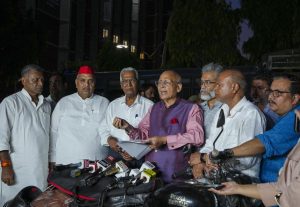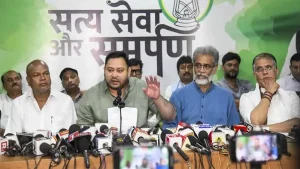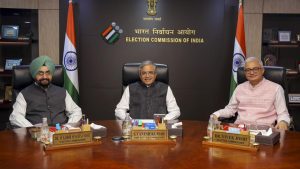Bihar – The Bihar Roll Revision has emerged as a major political flashpoint, with ten INDIA bloc parties raising serious concerns about the Election Commission’s ‘special intensive revision’ of electoral rolls in the poll-bound state. The opposition alliance has warned that this Bihar Roll Revision exercise could potentially disenfranchise between 2-3 crore voters, representing one of the most significant electoral controversies in recent memory.
A high-level delegation from the INDIA bloc met Chief Election Commissioner Gyanesh Kumar along with Election Commissioners Sukhbir Singh Sandhu and Vivek Joshi in New Delhi to voice their strong objections to the current Bihar Roll Revision process. The meeting highlighted deep divisions between the opposition and the Election Commission over the timing, methodology, and potential consequences of this electoral exercise.
Historical Context and Timing Concerns

The Bihar Roll Revision controversy stems from the fact that the last comprehensive revision was conducted in 2003, making this the first such exercise in 22 years. Congress leader and Rajya Sabha member Abhishek Manu Singhvi questioned the Election Commission’s rationale, asking whether the four or five Bihar elections held since 2003 were “faulty, imperfect, or unreliable.”
The timing of the Bihar Roll Revision has particularly alarmed opposition parties. Singhvi pointed out that the 2003 special intensive revision was conducted a year before the Lok Sabha elections and two years before the Assembly elections, providing adequate time for implementation. In contrast, the current Bihar Roll Revision is being conducted just one or two months before elections in India’s second most populous state, which has approximately 8 crore voters.
Documentation Requirements Spark Controversy
A central concern regarding the Bihar Roll Revision involves the stringent documentation requirements imposed by the Election Commission. The opposition has criticized the abandonment of the traditional combination of Aadhaar card and ration card, which had been used for several decades in electoral processes.
Also Read: Congress MLA Anirudh Singh Rana Booked For Assault on NHAI Officer In Shimla
Under the new Bihar Roll Revision guidelines, voters not on the 2003 electoral roll must produce birth certificates to establish residence or identity. More controversially, certain categories of voters must provide birth certificates of their parents, creating what opposition leaders describe as an impossible burden for many citizens.
Singhvi highlighted the particular challenges this Bihar Roll Revision requirement poses for Bihar’s diverse voter profile, including backward communities, flood-affected populations, poor citizens, Scheduled Castes, Scheduled Tribes, marginalized communities, and migrants. He questioned how these vulnerable populations could be expected to obtain birth certificates of their parents within such a short timeframe.
Scale of Potential Disenfranchisement


The INDIA bloc delegation presented alarming projections about the Bihar Roll Revision’s impact on voter participation. According to their analysis, upwards of 2.5 crore people could be disenfranchised, with a minimum estimate of 2 crore voters potentially losing their electoral rights.
This scale of potential voter exclusion through the Bihar Roll Revision would represent one of the largest instances of electoral disenfranchisement in Indian democratic history. Singhvi emphasized that such disenfranchisement constitutes “the worst attack on the basic structure of the Constitution,” undermining the principle of universal adult suffrage established in 1950.
Constitutional and Democratic Implications
The Bihar Roll Revision debate has raised fundamental questions about constitutional rights and democratic participation. Opposition leaders argue that wrongfully deleting or adding even a single voter creates an uneven playing field that affects elections and democracy, both of which form part of the Constitution’s basic structure.
The controversy surrounding the Bihar Roll Revision extends beyond mere administrative concerns to touch upon core democratic principles. The opposition contends that the exercise, if conducted improperly, could fundamentally alter the electoral landscape in Bihar and set dangerous precedents for other states.
Election Commission’s Stance and Response


During the meeting, the Election Commission defended the Bihar Roll Revision exercise, citing legal provisions under Article 326 of the Constitution and the Representation of the People Act, 1950. EC officials stated that the revision is being conducted in accordance with instructions issued on June 24, 2025.
The Election Commission addressed concerns raised by party representatives regarding the Bihar Roll Revision, though opposition leaders characterized the EC as “disinclined” to accept their submissions. One significant point of contention involved the opposition parties’ rapid increase in booth level officers (BLOs) following the Bihar Roll Revision announcement.
Opposition Unity and Diverse Representation
The Bihar Roll Revision meeting saw representation from multiple INDIA bloc parties, demonstrating unprecedented unity on this issue. Present at the meeting were leaders from Congress, RJD, Samajwadi Party, NCP-SCP, CPI(M), CPI(ML) Liberation, CPI, Shiv Sena (UBT), DMK, and JMM.


RJD MP Manoj Jha described the Bihar Roll Revision meeting as anything but cordial, expressing particular concern for poor, backward, minorities, Dalits, and Muslims who might be disproportionately affected. He alleged that the Election Commission is targeting the 20 percent of people who migrate from Bihar.
Migration and Voting Rights
The Bihar Roll Revision has highlighted complex issues surrounding migration and voting rights. CPI(ML) Liberation’s Dipankar Bhattacharya noted that the Election Commission cited statistics showing 20 percent of Bihar’s population migrates from the state.
According to opposition leaders, the Election Commission’s interpretation suggests that migrant workers cannot be considered voters since they are not “ordinarily resident” in their home constituencies. This interpretation of the Bihar Roll Revision guidelines could effectively disenfranchise millions of migrant workers who traditionally vote in their home constituencies.
Procedural Concerns and Access Issues
Beyond the substantive concerns about the Bihar Roll Revision, opposition parties also raised procedural objections about their interaction with the Election Commission. Singhvi criticized the restriction allowing only two persons per party at the meeting, with initial indications that only party presidents could attend.
These procedural limitations, according to the opposition, prevent necessary democratic dialogue between political parties and the Election Commission regarding the Bihar Roll Revision and other electoral matters.
Public Reaction and Political Mobilization
The Bihar Roll Revision has generated significant public discourse, with critics dubbing it “votebandi” in reference to the controversial demonetization exercise called “notebandi.” This comparison suggests public perception of the Bihar Roll Revision as another disruptive policy implementation with potentially widespread negative consequences.
Opposition leaders have warned that if the Election Commission proceeds with the current Bihar Roll Revision framework without addressing their concerns, it could lead to significant public unrest and political mobilization.
Future Implications and Recommendations
The INDIA bloc has suggested that while they are not opposed to electoral roll revision in principle, the Bihar Roll Revision should be conducted with greater caution, care, comprehensiveness, and adequate time allocation. They propose postponing the exercise until after the current elections, utilizing the five-year period before the next Bihar elections for a more thorough and inclusive process.
The Bihar Roll Revision controversy represents a critical test of India’s electoral democracy and the balance between electoral integrity and voter accessibility in the country’s evolving political landscape.

